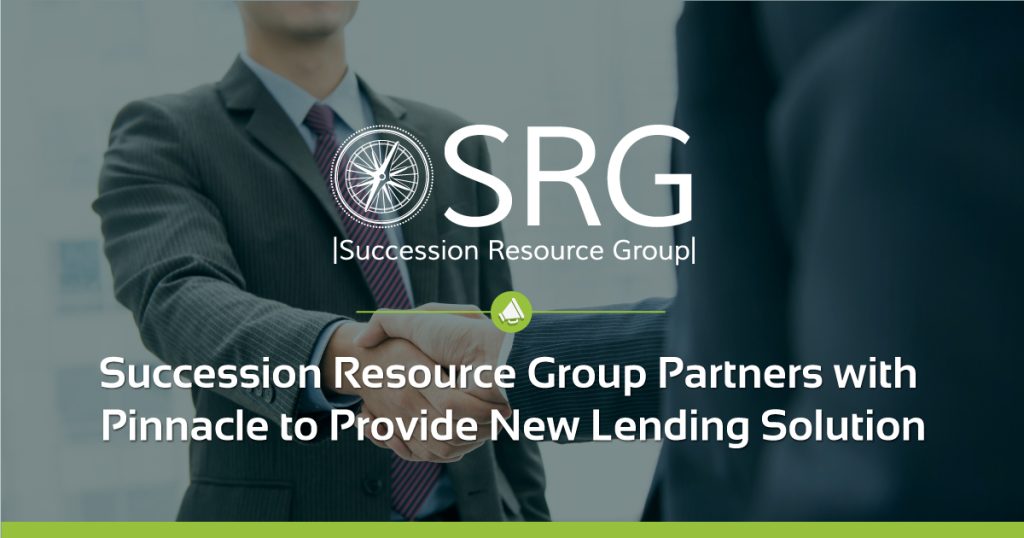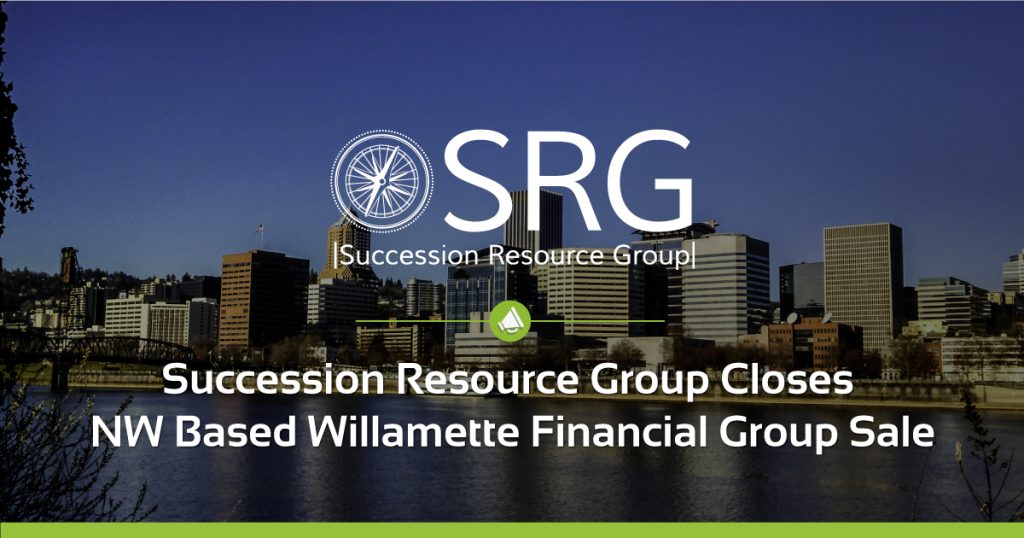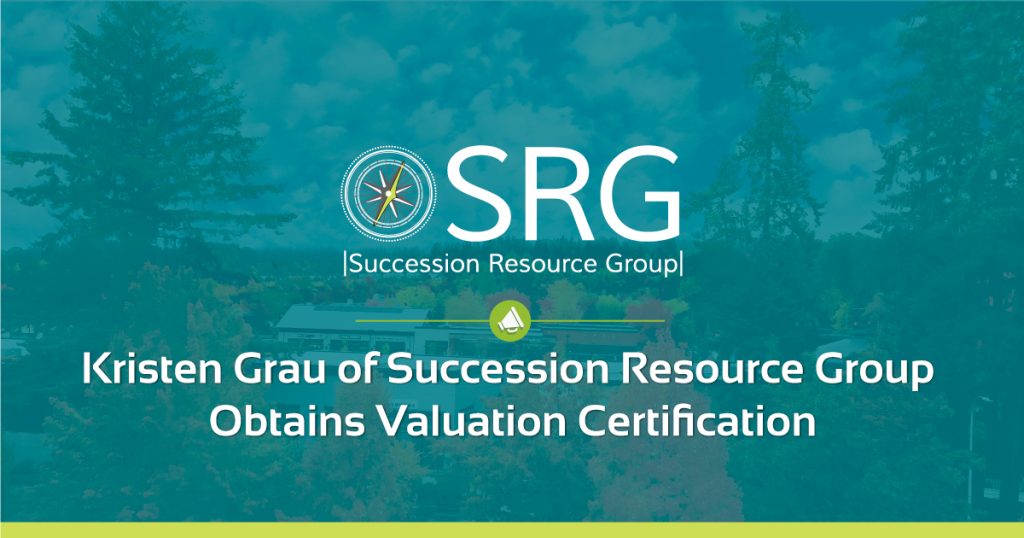Succession Resource Group Partners with Pinnacle to Provide New Lending Solution

Portland, Ore. (April 4, 2019) – Succession Resource Group (SRG) is announcing a new alliance with Pinnacle Commercial Capital (Pinnacle) to provide advisors a lending solution unlike those of SRG’s existing lending partners.
Succession Resource Group Closes NW Based Willamette Financial Group Sale

Portland, Ore. (March 20, 2019) – Succession Resource Group is pleased to announce the sale of Rex Brenton and Karen Curry of Willamette Financial Group (WFG) to Jon D. Lawry and W. Nick de Freitas of Lawry | de Freitas Wealth Management. The sale represented over $81 million in assets under management in the Portland, Oregon metro area. With over 35 years in the business, Rex and Karen had approximately 138 very loyal households, and in 2018 both decided to begin planning for their retirement. Their primary concerns were to find a buyer that had the same core values and similar commitment to client service, as well as a buyer who would use AssetMark (their preferred TAMP) in an effort to reduce disruption to the clients. SRG conducted a nationwide search, communicating with their existing buyers as well as numerous channel partners including AssetMark. Through rigorous screening, SRG identified 20 qualified buyers, of which six ‘elite’ buyers were selected and given the opportunity to submit an offer, all facilitated by SRG. After a few revisions and conversations, Rex and Karen accepted the offer from Nick and Jon that was 18% above asking, and all cash. Kristen Grau, Executive Vice President of SRG, said, “For Rex and Karen, fit was key. The first several weeks were spent sourcing and evaluating potential buyers, which happened before there were any conversations about price or terms with anyone. But once we have a group of great buyers, it does come down to who has the best offer, and Nick and Jon were committed to getting the deal done.” Following the recent closing and funding of their deal, Rex and Karen shared their perspective on the deal, “SRG was incredibly helpful throughout the entire process. From the initial practice evaluation, screening of potential buyers, comparing and ranking of offers and the completion of purchase agreements and documents, we could not have asked for a more thorough execution from the team at SRG. Their guidance and diligence was invaluable in getting this deal done.” Effective February 2019, WFG closed the transaction with Lawry | de Freitas, and shared that their motivation for providing such a strong offer was based on how similar in structure and philosophy the two firms were. “The fit seemed almost too good to be true. Through the acquisitions of these practices the past few years, we have been able to help seasoned advisors retire, maintain continuity of the client relationship and allow our firm to grow efficiently, a true win-win,” Co-Founder W. Nick de Freitas said. This closing marks the fourth acquisition by Lawry | de Freitas since they founded their independent firm in 2016. About Succession Resource Group Succession Resource Group, Inc. is a succession consulting firm helping financial professionals value, protect, merge/acquire, and develop exit strategies for their business. With decades of combined industry experience, SRG possesses a unique combination of skills, resources and expertise to help advisors understand the value of their business, develop strategies to improve that value, protect it with comprehensive contingency and succession plans, and grow through acquisition. For more information on Succession Resource Group, visit https://www.successionresource.com Contact: David Pan – PR & Marketing Coordinator Phone: 503.683.8959 Email: david.pan@successionresourcegroup.com ###
Succession Resource Group Closes Deal Between Dot Mechtenberg and Scott Forsyth

Portland, Ore. (Feb. 26, 2019) – Succession Resource Group is excited to announce the sale of Denver-based advisor Dorothy “Dot” Mechtenberg of Dot Mechtenberg, Inc. to Scott Forsyth of Capital Management Group. Both advisors are under Geneos Wealth Management, a boutique Colorado based RIA and independent Broker-Dealer. The sale represented over $75 Million in assets under management transitioned with all assets being retained on the Geneos platform. Ryan Diachok, President of Geneos, shared his thoughts on the deal, “Myself and the entire Geneos team are thrilled with this transaction! … Dot was able to find the perfect succession partner in Scott Forsyth. Geneos not only is able to assist in helping a wonderful advisor close this chapter of an amazing career in financial services, but we continue to be a part of Mr. Forsyth’s continued growth as he builds his world class organization…” Succession Resource Group first began working with Dot in late 2014, helping value her business and consult with her as she contemplated retirement. In early 2018, after looking at the various self-service bulletin board services, she committed to finding a buyer. Ultimately, she retained SRG for a full-service firm to help her find the best buyer and negotiate the sale. Succession Resource Group reviewed many possible buyers, resulting in 27 qualified buyers who were affiliated with or willing to affiliate with Geneos. The group was reduced to four buyers who represented the ideal combination of personality fit, business acumen, and organizational structure. SRG worked with each buyer to construct offers. With four above-asking offers, Dot selected Scott, which allowed him and his company to expand its footprint. Scott presented a very competitive offer, in large part thanks to the financing he was able to obtain from one of SRG’s lending partners, Live Oak Bank. After the sale closed, Dot shared, “Succession Resource Group was simply fabulous! They could not have been any better with the entire process!” With over 45 years in the business, Dot’s primary concern was to ensure that her successor took care of her clients the “Dot-way,” according to Erik Pahlow, Vice President of Succession Resource Group. He added, “Dot’s practice represented a tremendous opportunity for any buyer. One conversation with Dot and it’s clear she has wonderful relationships with her clients reducing any worry for client attrition.” In third-party transactions, SRG transacted $88.1 Million in advisor sales with $6.7 Billion in AUM transferring in 2018. About Succession Resource Group Succession Resource Group is a succession consulting firm helping financial professionals’ value, protect, merge, acquire, and develop exit strategies for their business. With decades of combined industry experience, SRG possesses a unique combination of skills, resources and expertise to help advisors understand the value of their business, develop strategies to improve that value, protect it with comprehensive contingency and succession plans, and grow through acquisition. For more information on Succession Resource Group, visit https://www.successionresource.com Contact: David Pan PR & Marketing Coordinator david.pan@successionresourcegroup.com (503) 683-8959
SRG Closes Fieldstone Financial Management Deal with FourStar Wealth

Portland, Ore. (February 11, 2019) – Succession Resource Group (SRG) is excited to announce the 4th transaction of the 2019 calendar year, with the sale of Boston based RIA – Fieldstone Financial Management to FourStar Wealth Advisors. FourStar is led by CEO Brian Kasal, who has taken his already successful Chicago based RIA with approximately $117 million in assets under management in its first five years in business to $350 million with this acquisition.
2019 Advisor Mergers & Acquisitions Annual Review

PORTLAND, Ore. (Jan. 21, 2019) — Succession Resource Group, Inc. (SRG) is publishing its fifth annual review on the M&A activities of RIA and securities professionals, recapping 2018 deal data and trends drawing on $88 million in third-party advisor sales and $6.7 billion in AUM transferred[1]. Based on the deals completed in 2018, total deal volume was up 37% and is expected to continue to increase into 2019, poised to see record deal volume should there be any major sustained market corrections. Other key findings listed in the 2019 Advisor Mergers and Acquisitions:
SRG Closes Berman Investment Advisors Deal with The Mather Group

Portland, Ore. (Nov. 30, 2018) – Succession Resource Group (SRG) is excited to announce the sale of their client Steve Berman of Berman Investment Advisors (Berman) to The Mather Group (TMG) who was recently listed on InvestmentNews Top 25 Fastest Growing $1 Billion+ RIAs list and Barron’s Top 100 Independent Advisor list.
Bloomfield Hills Financial Closes Third Deal with SRG

Portland, Ore. (Oct. 16, 2018) – Succession Resource Group (SRG) is excited to have facilitated Bloomfield Hills Financial (BHF) with the completion of its third acquisition, representing a combined $428 million in acquired assets under management with offices in five states. SRG represented the sellers in all three deals, evaluating between 40 and 60 interested parties in each instance. Despite immense demand and competition by each of the sellers, BHF was selected as the buyer in all three deals, allowing them to add a presence in California and Colorado. According to SRG’s president, David Grau Jr., all three deals were unique and noteworthy, highlighting the flexibility required of buyers in today’s competitive market. In 2016, SRG closed the first deal with BHF when they acquired SRG’s San Jose RIA listing, which brought BHF $160 million in fee-based assets. The second deal was completed in the second quarter of 2017, when they acquired SRG’s Denver listing, a firm that specialized in alternative investments representing $154 million in assets. The most recent deal involved SRG assisting BHF with the acquisition of a small broker-dealer based in East Lansing, Michigan that closed in 2018, and brought an additional $114 million in mutual fund assets. “There is a tremendous demand for quality practices,” Grau said. “We have no less than 50 interested buyers for every one of our listings, but only a small fraction of these buyers are qualified and meet the seller’s basic criteria. That is why we spend a significant amount of time screening and negotiating for our seller clients. We are always excited when we have a buyer like BHF that has the experience, capital, and infrastructure to complete deals, and is willing to provide our client a fair price for their life’s work.” Kevin VanDyke, CEO of BHF adds, “We worked closely with SRG and the sellers to get the deals to the finish line as mergers and acquisitions has been a key growth strategy of ours. It is important for us to maintain a professional connection with SRG as their service have been a major contributor to our rapid expansion. We really appreciate their knowledge and look forward to future acquisitions with them.” SRG reports that the deal volume has remained strong in 2018 and is looking to outpace the deal volume in 2017. SRG’s most recent closing on October 1, 2018 marks their 47th transaction of the year and was their largest to date, with the sale of its Northern California listing for an estimated $8.3 million dollars to a mid-west based RIA. About Bloomfield Hills Financial Founded in 1999 by Kevin VanDyke, Bloomfield Hills Financial (BHF) is an independently owned wealth management company, offering securities brokerage and investment advisory services to individuals, executives, and business owners to pursue the preservation of their purchasing power throughout their lifetime. By working with independent broker-dealer, First Allied Securities, Inc., BHF is free to provide investment options, services, and guidance that are most beneficial to helping clients achieve personal financial goals – free of bias or conflicts of interest. BHF has approximately $1.5 billion in advisory and brokerage assets as of December 31, 2017. About Succession Resource Group Succession Resource Group, Inc. is a succession consulting firm specialized in helping financial professionals value, protect, merge/acquire, and develop exit strategies for their business. With decades of combined industry experience, SRG possesses a unique combination of skills, resources and expertise to help advisors understand the value of their business, develop strategies to improve that value, protect it with comprehensive contingency and succession plans, and grow through acquisition. For more information on Succession Resource Group, visit https://www.successionresource.com Contact: David Pan – PR & Marketing Coordinator Phone: (503) 683-8959 Email: david.pan@successionresourcegroup.com 4800 Meadows Rd. Ste. 470 Lake Oswego, Oregon 97035 ###
Succession Resource Group Gives Free M&A Consulting at 2018 LPL Focus Conference

Free Consultation Pre-Registration is open for Conference Attendees Portland, Ore. (July 19, 2018) – Succession Resource Group (SRG) is excited to participate in the 2018 LPL Focus Conference in Boston, MA, from July 29 to August 1, and will be bringing three industry experts to provide free one-on-one consultations in their private meeting area at booth #30. These sessions will be focused on providing advice from experts with more than 30+ of combined experience who work with LPL advisors everyday.
Advisor Succession Experts Obtain Valuation Certification

Portland, Ore. (November 8, 2017) – Succession Resource Group (SRG), the leading provider of succession and valuation services to advisors, is pleased to announce that Kristen Grau, CPA, CVA has earned the designation of Certified Valuation Analyst (CVA) from the National Association of Certified Valuators and Analysts (NACVA).
Nicole Sinclair Reaches Five-Year Mark with SRG

“Congratulations Nicole, and thank you from all of us at Succession Resource Group. We have been honored to work with you and have you a part of our team these past five years. Your focus on assisting clients, dedication to timeliness, and sense of humor are a wonderful asset to our team and clients!” – The SRG Team